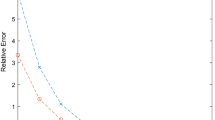Abstract.
A computational model of a learning system (LS) is described that acquires knowledge and skill necessary for optimal control of a multisegmental limb dynamics (controlled object or CO), starting from “knowing” only the dimensionality of the object’s state space. It is based on an optimal control problem setup different from that of reinforcement learning. The LS solves the optimal control problem online while practicing the manipulation of CO. The system’s functional architecture comprises several adaptive components, each of which incorporates a number of mapping functions approximated based on artificial neural nets. Besides the internal model of the CO’s dynamics and adaptive controller that computes the control law, the LS includes a new type of internal model, the minimal cost (IM mc ) of moving the controlled object between a pair of states. That internal model appears critical for the LS’s capacity to develop an optimal movement trajectory. The IM mc interacts with the adaptive controller in a cooperative manner. The controller provides an initial approximation of an optimal control action, which is further optimized in real time based on the IM mc . The IM mc in turn provides information for updating the controller. The LS’s performance was tested on the task of center-out reaching to eight randomly selected targets with a 2DOF limb model. The LS reached an optimal level of performance in a few tens of trials. It also quickly adapted to movement perturbations produced by two different types of external force field. The results suggest that the proposed design of a self-optimized control system can serve as a basis for the modeling of motor learning that includes the formation and adaptive modification of the plan of a goal-directed movement.
Similar content being viewed by others
Acknowledgments.
This study is supported in part by a PHS grant NS-07388 and in part by a DARPA grant MDA to JH. The support provided by the Harrington Bioengineering Department of Arizona State University is appreciated.
Author information
Authors and Affiliations
Corresponding author
Rights and permissions
About this article
Cite this article
Shimansky, Y., Kang, T. & He, J. A novel model of motor learning capable of developing an optimal movement control law online from scratch. Biol. Cybern. 90, 133–145 (2004). https://doi.org/10.1007/s00422-003-0452-4
Received:
Accepted:
Published:
Issue Date:
DOI: https://doi.org/10.1007/s00422-003-0452-4




